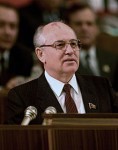 Mikhail Gorbachev (1931- ) was a Russian politician and the last General Secretary of the Soviet Union. His engagement with Western leaders, coupled with domestic political and economic reforms, contributed to bringing an end to the Cold War. Born into a peasant family in southern Russia, Gorbachev had a difficult childhood, enduring poverty, hard work on his father’s farm and Nazi occupation during World War II. As a boy Gorbachev received a state education and proved an excellent student, winning awards and an opportunity to study law at Moscow University in 1950. After graduating in 1955 Gorbachev joined the Communist Party and obtained a position in the Soviet bureaucracy. In 1956 he became First Secretary in the city of Stavropol. During the 1960s and 1970s, Gorbachev worked in economic planning, overseeing reforms and improvements to agricultural production. Gorbachev also ascended through the ranks of the Communist Party, joining its Central Committee (1971) and the Politburo (1980).
Mikhail Gorbachev (1931- ) was a Russian politician and the last General Secretary of the Soviet Union. His engagement with Western leaders, coupled with domestic political and economic reforms, contributed to bringing an end to the Cold War. Born into a peasant family in southern Russia, Gorbachev had a difficult childhood, enduring poverty, hard work on his father’s farm and Nazi occupation during World War II. As a boy Gorbachev received a state education and proved an excellent student, winning awards and an opportunity to study law at Moscow University in 1950. After graduating in 1955 Gorbachev joined the Communist Party and obtained a position in the Soviet bureaucracy. In 1956 he became First Secretary in the city of Stavropol. During the 1960s and 1970s, Gorbachev worked in economic planning, overseeing reforms and improvements to agricultural production. Gorbachev also ascended through the ranks of the Communist Party, joining its Central Committee (1971) and the Politburo (1980).
During the early 1980s, Gorbachev became one of the Soviet Union’s most widely travelled leaders, leading delegations and state visits to a number of Western countries. He visited Britain in 1984 and held talks with its prime minister, Margaret Thatcher. Writing later in her memoirs, Thatcher described Gorbachev as professional and likeable, “a man with whom I could do business“. Gorbachev became General Secretary of the Soviet Union after the death of Konstantin Chernenko in March 1985. He was chosen for his youth and robust health, his international experience and his ability to improve production and economic outcomes. His maiden speech maintained a commitment to communism but hinted at economic reforms to increase output and improve living standards. Within three years of becoming leader Gorbachev had announced two major policy shifts: perestrokia (‘restructuring’) and glasnost (‘openness’). He also improved relations between the USSR and the West, dumping Andrei Gromyko from the foreign ministry and forging new ties with US president Ronald Reagan and Margaret Thatcher. This gave rise to a 1987 treaty reducing nuclear missile numbers.
In the late 1980s, Gorbachev had relaxed Moscow’s political control over nations in the Soviet bloc. This gave rise to the liberal reforms that swept through Europe in 1989. In 1988 Gorbachev ordered the withdrawal of Soviet troops from Afghanistan after a decade of occupation. These changes saw him awarded the Nobel Peace Prize in 1990. Gorbachev’s reforms failed to stem economic problems within the Soviet Union, however, which disintegrated into smaller republics in 1990-91. Outraged communist hardliners attempted to remove Gorbachev in an August 1991 coup, but after two days it was thwarted by political and popular opposition. The coup led to Gorbachev’s resignation from the Communist Party and the formation of the Commonwealth of Independent States (CIS) by several former Soviet republics. Gorbachev resigned from the Soviet leadership in December 1999. In retirement he has been a commentator on world affairs, recently expressing strong criticisms of Vladimir Putin.
Content on this page is © Alpha History 2018-23. This content may not be republished or distributed without permission. For more information please refer to our Terms of Use.
This page was written by Jennifer Llewellyn and Steve Thompson. To reference this page, use the following citation:
J. Llewellyn & S. Thompson, “Mikhail Gorbachev”, Alpha History, accessed [today’s date], https://alphahistory.com/coldwar/mikhail-gorbachev/.
